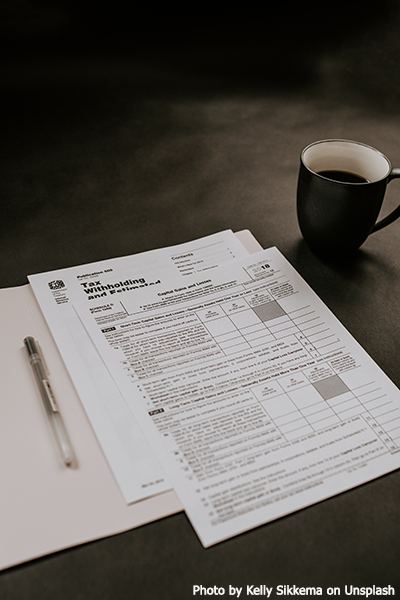
BIR Clarifies Its Voluntary Assessment and Payment Program (VAPP)
By: Atty. Lino Ernie M. Guevara
"More than two months to go before the December 31 deadline ends for taxpayers to avail of the Voluntary Assessment and Payment Program (VAPP) under Revenue Regulations (RevReg) No. 21-2020, the Bureau of Internal Revenue (BIR) issued a circular to make clearer its implementation aiming to provide answers to taxpayers’ questions.
Revenue Memorandum Circular (RMC) No. 111-2020 was issued by the BIR to clarify various open issues relating to VAPP availment under the said regulations. This certainly heightens efficacy in its implementation and aids taxpayers interested to avail and revenue officers tasked to process the VAPP applications."
Is a taxpayer entitled to a ‘No Audit’ privilege if it selects to pay not all, but just some tax types from among those it is currently registered?
More than two months to go before the December 31 deadline ends for taxpayers to avail of the Voluntary Assessment and Payment Program (VAPP) under Revenue Regulations (RevReg) No. 21-2020, the Bureau of Internal Revenue (BIR) issued a circular to make clearer its implementation aiming to provide answers to taxpayers’ questions, including the one raised above.
Revenue Memorandum Circular (RMC) No. 111-2020 was issued by the BIR to clarify various open issues relating to VAPP availment under the said regulations. This certainly heightens efficacy in its implementation and aids taxpayers interested to avail and revenue officers tasked to process the VAPP applications.
First off, the RMC now specifically spelled out the clear dates of the VAPP coverage, especially for one-time transactions (ONETT). For ONETT of individuals and taxpayers on a calendar year basis, the VAPP covers all transactions from January to December 2018. For those on a fiscal year basis, the covered ONETT are those within their fiscal year 2018. If the fiscal year of the taxpayer is from May 1, 20l8 to April 30, 2019, the ONETT covered is within this inclusive period.
 One of the more vital clarifications made relates to the question posed above. Unfortunately, the answer is NO. The ‘No Audit‘ privilege for taxable year 2018 will only be availed of if the application covers ALL tax types a taxpayer is registered under. According to the BIR, the “(a)vailment should cover all the tax types to which the taxpayer is registered, including withholding taxes, except when the taxpayer is pursuing a claim for tax credit/refund, in which case, he can leave out the tax type for such claim” (Question and Answer No. 3, RMC 111-2020). Likewise, the RMC expressly stated that if a business taxpayer wants to avail of the VAPP benefit, the “availment should cover both Sections 9.a. and 9.b.” (Question and Answer No. 6, RMC 111-2020). Further, in Question and Answer No. 32 on whether VAPP availment by taxpayers with duly issued but protested Final Assessment Notice (FAN) is allowed, the BIR confirms it is allowed provided that ALL tax types of the taxpayer are covered in the availment.
One of the more vital clarifications made relates to the question posed above. Unfortunately, the answer is NO. The ‘No Audit‘ privilege for taxable year 2018 will only be availed of if the application covers ALL tax types a taxpayer is registered under. According to the BIR, the “(a)vailment should cover all the tax types to which the taxpayer is registered, including withholding taxes, except when the taxpayer is pursuing a claim for tax credit/refund, in which case, he can leave out the tax type for such claim” (Question and Answer No. 3, RMC 111-2020). Likewise, the RMC expressly stated that if a business taxpayer wants to avail of the VAPP benefit, the “availment should cover both Sections 9.a. and 9.b.” (Question and Answer No. 6, RMC 111-2020). Further, in Question and Answer No. 32 on whether VAPP availment by taxpayers with duly issued but protested Final Assessment Notice (FAN) is allowed, the BIR confirms it is allowed provided that ALL tax types of the taxpayer are covered in the availment.
Hence, no selective tax payment under this VAPP for you.
Note that RevReg 21-2020 presented the “amount of taxes to be paid as a condition to avail the privilege” in two (2) SEPARATE subsections under Section 9 of the regulations. Section 9.a. spoke of income tax, VAT, percentage tax, excise tax and DST (other than DST on ONETTT) while Section 9.b was for Final Withholding Taxes (on compensation, fringe benefits, etc.) and Creditable Withholding Taxes (CWT) (other than CWT on ONETT). It went on to state that “(f)or purposes of VAPP availment under Sections 9.a and 9.b, taxpayers must apply for all registered taxes indicated therein in order to avail of the privilege set forth under Section 10.” Such separate presentation and treatment of the different tax types (i.e., segregating the withholding taxes from the other taxes) as well as the wordings of the regulations as quoted previously (i.e., registered taxes indicated therein) gave taxpayers the impression they have the option to choose from either tax type grouping to pay VAPP, that is, either under Section 9.a. or 9.b., and still enjoy the ‘No Audit’ privilege for the tax type paid. For instance, if a company anticipates no possible audit issues relative to CWT or has a strong defense for it against the ongoing BIR audit, the Company may decide to just pay the taxes under Section 9.a. only and forego availment under Section 9.b. For some taxpayers, this scenario could be more reasonable and manageable in terms of cost and in weighing the rationale or justification for the VAPP application. The BIR may wish to take a second look at this clarificatory rule in the RMC to encourage more VAPP availment.
Moreover, for those taxpayers with FANs issued showing the amount of proposed deficiency taxes, the BIR eases the taxpayers concern by clarifying in the RMC that the “amount on the FAN for the 2018 audit case will, in no way, affect the computation of the voluntary payment for VAPP”. Hence, those assessed amounts, no matter how substantial, should not be considered by the BIR for the VAPP computation.
the RMC that the “amount on the FAN for the 2018 audit case will, in no way, affect the computation of the voluntary payment for VAPP”. Hence, those assessed amounts, no matter how substantial, should not be considered by the BIR for the VAPP computation.
The other major concern for taxpayers in deciding whether to avail of VAPP or not is the waiver rule on refund claim under Section12 of RevReg 21-2020 (i.e., any payment made is construed as a waiver of the taxpayer’s right to claim for refund or credit) The RMC clarified that the waiver referred to in Section 12 of said regulations applies only to claims for refund on erroneous payment. Moreover, if the taxpayer applies for VAPP but declines to waive his right to claim for refund, he can leave out the tax type for the said refund and the same shall not be covered by the availment. Further, a taxpayer with a claim for tax credit or refund can avail of the VAPP under Section 9.a., e.g. VAT refund, and the audit/verification and processing of the claim shall be continued, even if the corresponding tax type is included in the availment. With this waiver rule clarified, those taxpayers with pending refund claims but wanting to avail of the VAPP benefits can make a more informed decision as to their VAPP applications.
But I was also hoping that the said RMC could have shed light as well as to how the BIR determines an INVALID availment mentioned under Section 10 of the regulations. The RMC merely reiterated that the VAPP payment shall be constituted as payment of deficiency taxes assessed for taxable year 2018 and that the taxpayer will be notified by the BIR of the denial and the reasons therefor. (It appears there is no mechanism for appeal or reconsideration of the VAPP denial under the rules.) Note that said Section 10 provides for a situation where if the VAPP application was made by a taxpayer currently being subjected to an audit, the latter shall be suspended first. But the audit shall resume once the availment has been found to be “invalid”. It then provides that despite the issuance of a Certificate of Availment (CA), the taxpayer’s availment shall be rendered “invalid”. In this case, it shall be subjected to audit or investigation following prescribed procedures under existing rules upon “prior authorization and approval of the Commissioner of Internal Revenue” in certain instances. These instances include: (a)when there is a strong evidence or findings of under-declaration of sales/receipt or overstatement of deductions by more than 30% based on the revenue official’s written report stating the facts and supporting documents; and/or (b) when there is verifiable information that the taxpayer withheld but failed to remit withholding taxes. Section 10 seems to contemplate two different scenarios where in the first, there was an “invalid” availment and in the second, the availment, or in effect, the CA, was rendered invalid, despite prior CA issuance, based on the two (2) instances cited above. Both the regulations and the circular failed to elucidate what constitutes such “invalid” availment under the first scenario. What then should be the proper grounds for such VAPP availment to be “invalid”? Should those instances cited also apply? From the plain reading of the regulations itself, a full and timely compliance by the taxpayer with the correct amount to be paid for availment under Section 9 as well as the complete satisfaction of the conditions for availment, including the submission of mandatory and additional requirements, under Section 5 of the regulations, should merit the VAPP approval and CA issuance. The taxpayers could have been better guided and informed if the said RMC likewise dwelt on this issue of “invalid” availment.
For the other clarifications made by the BIR, you may wish to refer to the said RMC 111-2020.
The success of any voluntary payment program such as this one is always ultimately measured by the collections hauled for the government driven by clearer rules and guidelines. And this VAPP’s success could not have been more relevant at this time. The government’s clarion call to taxpayers intensifies as its need for more revenue reverberates during its continuing battle with COVID-19.
The author is a special counsel of Du-Baladad and Associates Law Offices (BDB Law), a member-firm of WTS Global.
The article is for general information only and is not intended, nor should be construed as a substitute for tax, legal or financial advice on any specific matter. Applicability of this article to any actual or particular tax or legal issue should be supported therefore by a professional study or advice. If you have any comments or questions concerning the article, you may e-mail the author at This email address is being protected from spambots. You need JavaScript enabled to view it. or call 8403-201 local 160.



